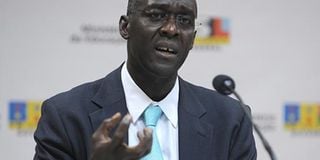Sub-Saharan Africa posts slowest growth in 6 years

Mr Makhtar Diop, the World Bank Vice President for Africa.
What you need to know:
Cited. Fall blamed on sharp drop in oil prices and other commodities.
Kampala. Economic growth in sub-Saharan Africa has declined to 3.7 per cent, the lowest level in six years, a new World Bank report has revealed. The new report was released on Monday.
The fall signifies the difficult economic times Uganda and other African countries are facing.
The affected countries are currently experiencing reduced foreign exchange earnings from commodity exports due to slowdown in global trade, low foreign direct investment and capital outflows thus leading to low economic growth.
The new Africa’s Pulse (report), the bi-annual analysis of economic trends and the latest data on the continent, also shows that growth will slow down in 2015 to 3.7 per cent from 4.6 per cent in 2014, reaching the lowest growth rate since 2009.
Why the slowdown
The World Bank said sharp drops in the price of oil and other commodities have brought the recent weakness in growth adding that other external factors such as China’s economic slowdown and tightening global financial conditions weigh on Africa’s economic performance.
In the report, the World Bank explains that the 2015 forecast remains below the robust 6.5 percent growth in GDP, which the region sustained in 2003-2008, and drags below the 4.5 per cent growth following the global financial crisis in 2009-2014. Overall, growth in the region is projected to pick up to 4.4 per cent in 2016, and further strengthen to 4.8 per cent in 2017.
In the past years, Uganda and other African economies have been supported by the high commodity prices in the international market, high private capital remittance and foreign direct investment.
Sub-Saharan Africa’s rich natural resources have made it a net exporter of fuel, minerals and metals, and agricultural commodities. These commodities account for nearly three-fourths of the region’s goods exports.
Robust supplies and lower global demand have accounted for the decline of commodity prices across the board.
For instance, the drop in the prices of natural gas, iron ore, and coffee exceeded 25 per cent since June 2014.
Speaking about the report from Washington DC, the World Bank vice president for Africa Makhtar Diop, said: “Implementing the right policies to boost agricultural productivity, and reduce electricity costs while expanding access, will improve competitiveness and support the growth of light manufacturing.”
Posting growth
Several countries such as Cote d’Ivoire, Ethiopia, Mozambique, Rwanda and Tanzania are expected to sustain growth at around 7 per cent or more per year in 2015 to 2017, spurred by investments in energy and transport, consumer spending and investment in the natural resources sector.




